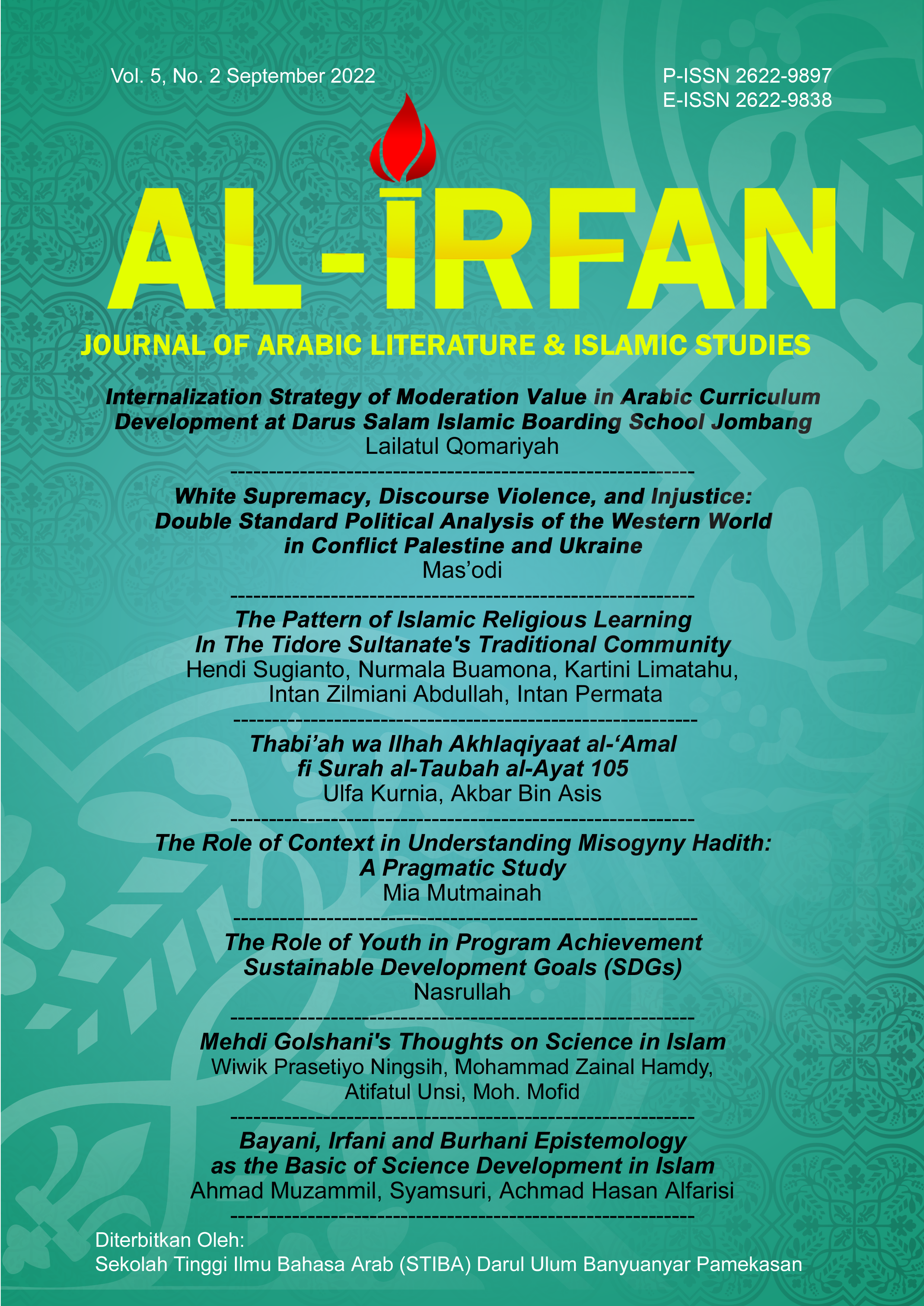Bayani, Irfani and Burhani Epistemology as the Basic of Science Development in Islam
Epistemologi
DOI:
https://doi.org/10.36835/alirfan.v5i2.5773Keywords:
Epistemology, Bayani, Irfani, BurhaniAbstract
Epistemology or the theory of science is a very crucial study, because it discusses a very fundamental aspect of human life, namely science. Epistemology investigates philosophically about the structure, methods, validity and goals of science. In the development of Islamic philosophy, epistemology as a new discipline of science that examines intuition and revelation. Intuition is knowledge that comes from God in the form of new views without deduction, speculation and observation. This kind of knowledge in Islam is called Ilm al-Wahby or 'Ilm al-Laduny whose position is lower than revelation. There are three epistemologies of science in Islam, namely bayani, irfani and burhani epistemologies. Bayani epistemology departs from religious texts using an orthodox approach, Burhani epistemology uses a philosophical approach, while Irfani epistemology uses a mystical approach. The approach used in this study is a qualitative research approach. This type of research is Library Research, which is an attempt to obtain data from various books or referencesReferences
Abdullah, A. (1999). Studi Agama Normativitas atau Historitas. Pustaka Pelajar.
Al-Jabiri, M. A. (2002). Bunyah al-Aqla al-A’rabi. Wahdah ’Arabiyah.
Al-Jabiri, M. A. (2003). Formasi Nalar Arab: Kritik Tradisi Menuju Pembebasan dan Pluralisme Wacana Interreligius, terj.Imam Khoiri. IRCiSoD.
Al-Khuli, A. (1959). Min Huda al-Qur’an al-Qadat al-Rasul. Dar al-Ma’arif.
Amin, M. M. (1983). Epistemologi Islam: Pengantar Filsafat Pengetahuan Islam. UI Press.
Arif, M. (2008). Pendidikan Islam Transformatif. Bumi Aksara.
Arikunto, S. (2013). Prosedur Penelitian Suatu Pendekatan Praktik (15th ed.). PT.Rineka Cipta.
Hamdy, M. Z. (2020). TELAAH KEMBALI PEMAHAMAN SISTEM KETATANEGARAAN DALAM ISLAM ( KHILAFAH ) ( Kajian historis dan ideologis terhadap gerakan HTI di Indonesia ). Syaikhuna: Jurnal Pendidikan Dan Pranata Islam, 11(October), 158–172. https://doi.org/https://doi.org/10.36835/syaikhuna.v11i2.4013
Ishaq, M. (1980). Tokoh-tokoh Filsafat Islam dan Barat (Spanyol). Bina Ilmu.
Kartanegara, M. (2003). Menyibak Tirai Kejahilan, Pengantar Epistemologi Islam. Mizan.
Khalaf, A. W. (1996). Ilm Ushul Fiqh, terj. Masdar Hilmi. Gema Risalah Press.
Maimun, A. (2021). Integrasi Islam dan Sains ( Analisis Problematika dan Level Integrasi ). Al-Irfan: Journal of Arabic Literature and Islamic Studies, 4(2), 149–169.
Moeleong, L. J. (2011). Metodologi Penelitian Kualitatif. PT. Remaja Rosda Karya.
Nashr, H. (1994). Tasawuf Dulu & Sekarang, terj.Abd Hadi. Pustaka Firdaus.
Nasution, A. T. (2016). Hakikat Mencari Pengetahun. Bumi Aksara.
Nasution, H. (1962). Falsafat dan Mistisisme. Bulan Bintang.
Nasution, H. (1973). Filsafat Agama. Bulan Bintang.
Ningsih, W. P., & Hamdy, M. Z. (2021). إدارة بيئة اللغة العربية : تكوينا وتطبيقا. Muhadasah: Jurnal Pendidikan Bahasa Arab, 3(2), 139–153.
Salam, B. (2003). Pengantar Filsafat. Bumi Aksara.
Suhartono, S. (2008). Fisafat Ilmu pengetahuan. ar-ruz media.
Sumantri, J. S. (1998). Filsafah Ilmu, Sebuah Pengembangan Populasi. Pustaka Sinar Harapan.
Susanto, H. (2014). Filsafat Manusia Ibnu Arabi. Tsaqafah, 10(1), 109. https://doi.org/10.21111/tsaqafah.v10i1.66
Syarif, M. (1991). History of Muslim Philosophy terj. Ilyas Hasan. Mizan.
Yazdi, M. H. (1994). Ilmu Hudhuri, terj. Ahsin Muhammad. Mizan.
Downloads
Published
How to Cite
Issue
Section
License
Copyright (c) 2022 Ahmad Muzammil, Syamsuri Harun, Achmad Hasan Alfarisi

This work is licensed under a Creative Commons Attribution 4.0 International License.
Lisensi :
Al-Irfan: Journal of Arabic Literature and Islamic Studies is published under conditions Creative Commons Attribution 4.0 International License / CC BY 4.0 This license permits anyone to copy and redistribute this material in any form or format, modify, modify, and make derivative works of this material for any purpose, including commercial purposes, so long as they credit the author for the original work.











